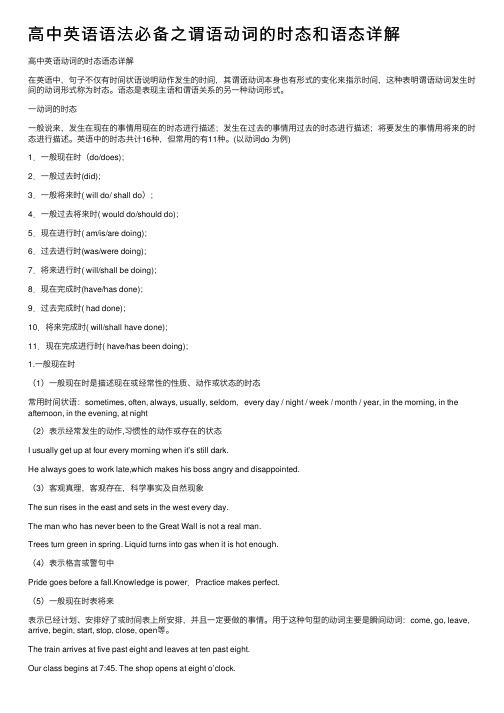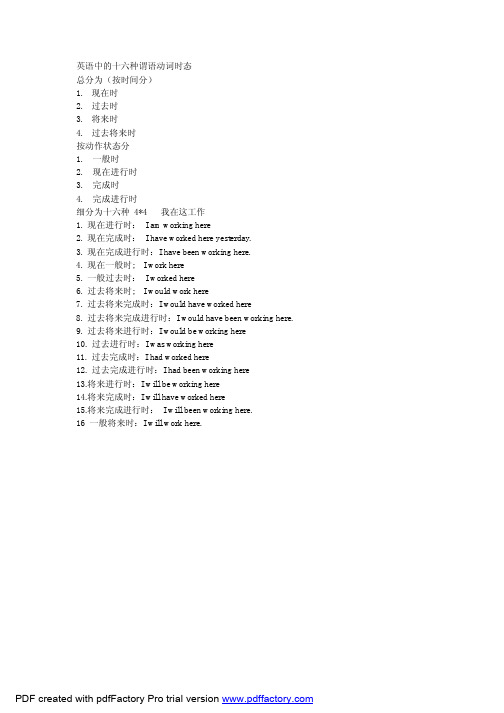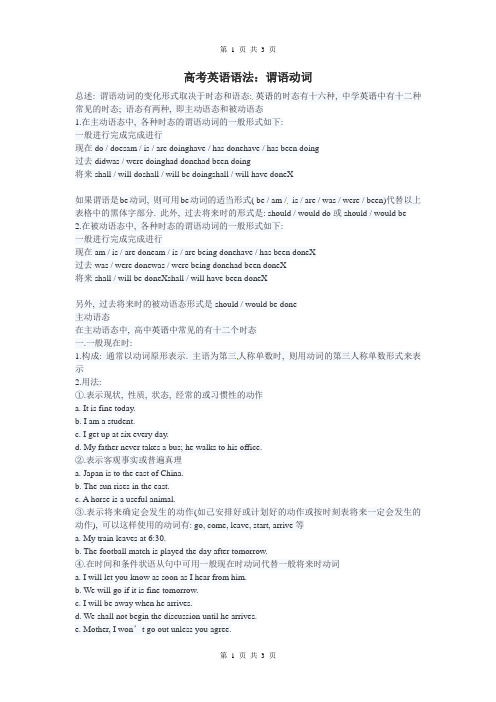英语中的十六种谓语动词时态
英语十六大时态表格总结

2.时h, yeaere态;在行…),放过去习r为动in 200惯性、于词前0, jus经常性句do的动首。t now,加在其作、行one d2.前加为。ay, lo用didng lon助,动tg ago,n'同时词d etc.
精品文档
,Wa11,立The四个大体英语共有十六个时态Wa足s/wnextW一般、进行、完成、完成进行。)(主:四个体为——s/wasere day于ere放/w过(mor便于大家下面用表格的形式给大家罗列出来,er去于+noning,t+g某Yeae+句记忆oin首,一gor)twoinThe时g
其为动once a助他词,动week,
则在on Mon词d其前odays,提do问,etc.
加;'如tn若主主语为语第三为人称第单三数,人则用称does单,'t数,n同时则还原d用行为oe动s,词。同时
.
精品文档
还原为动词原形。主语2、表示现b主语now, a+am/ is/把+am/are +doing t thise现阶段或动is/词time,在说话时are放正在进进these +no在行的动days,行t +d句etc.作或状时oing首。态。
follould/g刻,o+d否定义时间状一结构从showingtoo定句语般过2+uldmo,疑形式提wonthdo去问看uld/(wee2,到句将w句k) etsho1.am 1.be动词1.经常、often,c首ouuld来,/is/1、反复发行为动词usual把2.常ld+noare+ ly, al主语+be+一生的动动其他用t+d/snot作或行词bways,般于oho此e放为及现现2.someti宾ul时态mes, e在在的某于语d的谓时句very种状从+语动首。况。day(we句do词若2.ek,mon中+为行用th),
高中英语语法必备之谓语动词的时态和语态详解

⾼中英语语法必备之谓语动词的时态和语态详解⾼中英语动词的时态语态详解在英语中,句⼦不仅有时间状语说明动作发⽣的时间,其谓语动词本⾝也有形式的变化来指⽰时间,这种表明谓语动词发⽣时间的动词形式称为时态。
语态是表现主语和谓语关系的另⼀种动词形式。
⼀动词的时态⼀般说来,发⽣在现在的事情⽤现在的时态进⾏描述;发⽣在过去的事情⽤过去的时态进⾏描述;将要发⽣的事情⽤将来的时态进⾏描述。
英语中的时态共计16种,但常⽤的有11种。
(以动词do 为例)1.⼀般现在时(do/does);2.⼀般过去时(did);3.⼀般将来时( will do/ shall do);4.⼀般过去将来时( would do/should do);5.现在进⾏时( am/is/are doing);6.过去进⾏时(was/were doing);7.将来进⾏时( will/shall be doing);8.现在完成时(have/has done);9.过去完成时( had done);10.将来完成时( will/shall have done);11.现在完成进⾏时( have/has been doing);1.⼀般现在时(1)⼀般现在时是描述现在或经常性的性质、动作或状态的时态常⽤时间状语:sometimes, often, always, usually, seldom,every day / night / week / month / year, in the morning, in the afternoon, in the evening, at night(2)表⽰经常发⽣的动作,习惯性的动作或存在的状态I usually get up at four every morning when it’s still dark.He always goes to work late,which makes his boss angry and disappointed.(3)客观真理,客观存在,科学事实及⾃然现象The sun rises in the east and sets in the west every day.The man who has never been to the Great Wall is not a real man.Trees turn green in spring. Liquid turns into gas when it is hot enough.(4)表⽰格⾔或警句中Pride goes before a fall.Knowledge is power.Practice makes perfect.(5)⼀般现在时表将来表⽰已经计划、安排好了或时间表上所安排,并且⼀定要做的事情。
英语的16种时态

英语的16种时态英语共有十六种时态,其表现形式如下(以study为例)一般时 进行时 完成时 完成进行时现在 study be studying have studied have been studying过去 studied be studying had studied had been studying将来 will study wil be studying will have studied will have been studying过去将来would study would be studying would have studied would have been studying时态(Tense)是表示行为、动作和状态在各种时间条件下的动词形式。
因此,当我们说时态结构的时候,指的是相应时态下的动词形式。
1. 一般现在时英语时态分为16种:一般现在、一般过去、一般将来、过去将来时,以及这四者的进行时、完成时和完成进行时。
用法:A) 表示现在发生的动作、情况、状态和特征。
B) 习惯用语。
C) 经常性、习惯性动作。
例:He always helps others. (他总是帮助别人。
)D) 客观事实和普遍真理。
尤其要注意,如果前后文不是一般现在时,则无法保持 主句、从句时态一致。
E) 表示一个按规定、计划或安排要发生的动作,(仅限于某些表示“来、去、动 、停、开始、结束、继续”等的动词)可以与表示未来时间的状语搭配使用 。
常见的用法是:飞机、火车、轮船、汽车等定期定点运行的交通方式。
例:The next train leaves at 3 o'clock this afternoon.(下一趟火车今天下午3点开车。
) How often does this shuttle bus run? (这班车多久一趟?)F) 在时间和条件状语从句里经常用一般现在(有时也用现在完成时)表示将来事情。
谓语动词的时间语态及进行语态

should have been studying
would have been studying
谓语动词的时间语态
当所说的事情发生在不同时间时,英语句子的谓语要“变脸”, 出来的样子叫“时间语态”简称“时态”。 时态是英语谓语最大的一种变脸,它一共有8个变化,也叫8个时 态,它们分别是:
20 years by that summer.
感 谢
感 谢
阅阅
读读
2.一般过去时态(V-ed)
当谓语动词发生在”现在以前”时间内,我们就说动作发生 在
“一般过去”时间内。
表达这个时段的时间词可以是yesterday, long time ago,5 years ago, two days early, in 1949,at the end of last year, when you came, he said等 I watched TV last night. They were here only a few minutes ago
6.过去将来时态(should+V)
当谓语动词的动作发生在“从过去看将来”时间时,动词的 动
作发生在“过去将来”时间段内。
当讲一个过去的事件时,事件中又提到一件将要发生的事。 这个事件就发生在“从过去看将来”时间里,比如“昨天他 说他要去国外旅游”。这里的“去”就发生在过去将来时间 里。 He told me he would go to Beijing. I didn't know if he would come.
3. 将来进行时(shall/will + be+ v- ing) You will be making a mistake.
英语中的十六种谓语动词时态

英语中的十六种谓语动词时态
总分为(按时间分)
1.现在时
2.过去时
3.将来时
4.过去将来时
按动作状态分
1.一般时
2.现在进行时
3.完成时
4.完成进行时
细分为十六种4*4 我在这工作
1. 现在进行时:I am working here
2. 现在完成时:I have worked here yesterday.
3. 现在完成进行时:I have been working here.
4. 现在一般时; I work here
5. 一般过去时:I worked here
6. 过去将来时; I would work here
7. 过去将来完成时:I would have worked here
8. 过去将来完成进行时:I would have been working here.
9. 过去将来进行时:I would be working here
10. 过去进行时:I was working here
11. 过去完成时:I had worked here
12. 过去完成进行时:I had been working here
13.将来进行时:I will be working here
14.将来完成时:I will have worked here
15.将来完成进行时:I will been working here.
16 一般将来时:I will work here.
PDF created with pdfFactory Pro trial version 。
动词时态的用法说明(初中英语)

动词时态一、概念:英语中不同时间和方式发生的动作或状态要用谓语动词的不同形式来表示,这种表示动作或状态发生时间和方式的动词形式称作动词时态。
二、动词时态的种类:动词时态共16种,但初中阶段要求掌握的有八种:一般现在时一般过去时现在进行时过去进行时一般将来时过去将来时现在完成时过去完成时三、动词时态的构成:1.一般现在时(do、does);2.一般过去时(did);3.一般将来时( will do)(be going to do);4.过去将来时( would do)/(was/were going to do);5.现在进行时( am/is/are doing);6.过去进行时(was/were doing);7. 现在完成时(have done);8.过去完成时( had done);四、动词时态用法解读:1. 一般现在时1) 经常性或习惯性的动作,常与表示频率的时间状语连用。
时间状语:every…,sometimes,often, always, in the morning. at…,on SundayI leave home for school at 7 every morning.,twice a week2) 客观事实,普遍真理。
The earth moves around the sun.Shanghai lies in the east of China.3) 表示格言或警句中。
Pride goes before a fall.骄者必败。
注意:此用法如果出现在宾语从句中,即使主句是过去时,从句谓语也要用一般现在时。
例:Columbus(哥伦布)proved that the earth is round..4) 现在时刻的状态、能力、性格、个性。
I don't want so much.Ann Wang writes good English but does not speak well.比较:Now I put the sugar in the cup.I am doing my homework now.5﹞主将从现﹝主句用将来时从句用现在时﹞①I will tell you,When Li Ming comes②I'll e-mail you as soon as I get to Beijing.注一般从句为时间状语从句「由When As soon as...引导的从句」条件状语从句「由If...引导的从句」6)表示按计划,规定要发生的动作,但仅限于少数动词如:begin,come,leave,go等The meeting begins at seven.2. 一般过去时1)在确定的过去时间里所发生的动作或存在的状态。
高考英语语法:谓语动词

高考英语语法:谓语动词总述: 谓语动词的变化形式取决于时态和语态:英语的时态有十六种, 中学英语中有十二种常见的时态; 语态有两种, 即主动语态和被动语态1.在主动语态中, 各种时态的谓语动词的一般形式如下:一般进行完成完成进行现在do / doesam / is / are doinghave / has donehave / has been doing过去didwas / were doinghad donehad been doing将来shall / will doshall / will be doingshall / will have doneX如果谓语是be动词, 则可用be动词的适当形式( be / am /is / are / was / were / been)代替以上表格中的黑体字部分. 此外, 过去将来时的形式是: should / would do或should / would be 2.在被动语态中, 各种时态的谓语动词的一般形式如下:一般进行完成完成进行现在am / is / are doneam / is / are being donehave / has been doneX过去was / were donewas / were being donehad been doneX将来shall / will be doneXshall / will have been doneX另外, 过去将来时的被动语态形式是should / would be done主动语态在主动语态中, 高中英语中常见的有十二个时态一.一般现在时:1.构成: 通常以动词原形表示. 主语为第三人称单数时, 则用动词的第三人称单数形式来表示2.用法:①.表示现状, 性质, 状态, 经常的或习惯性的动作a. It is fine today.b. I am a student.c. I get up at six every day.d. My father never takes a bus; he walks to his office.②.表示客观事实或普遍真理a. Japan is to the east of China.b. The sun rises in the east.c. A horse is a useful animal.③.表示将来确定会发生的动作(如己安排好或计划好的动作或按时刻表将来一定会发生的动作), 可以这样使用的动词有: go, come, leave, start, arrive等a. My train leaves at 6:30.b. The football match is played the day after tomorrow.④.在时间和条件状语从句中可用一般现在时动词代替一般将来时动词a. I will let you know as soon as I hear from him.b. We will go if it is fine tomorrow.c. I will be away when he arrives.d. We shall not begin the discussion until he arrives.e. Mother, I won’t go out unless you agree.f. Don’t try to run before you begin to walk.⑤.在某些以here / there开头的句子中用一般现在时动词表示现在正在发生的动作a. Here comes the bus.=The bus is coming.b. There goes the bell.⑥.在体育比赛过程中, 解说员叙述迅速, 短暂动作时, 可用一般现在时, 表示正在进行的或刚刚发生的动作a. Ma Lianbao passes the ball to Mu Tiezhu, Mu shoots –a fine shot !⑦.在剧本或图片的说明文字中, 用一般现在时表示动作a. When the curtain rises, Juliet is sitting at her desk. The phone rings. She picks it up and listens quietly.二.现在进行时:1.构成: am / is / are doing2.用法:①.表示说话时正在进行着的动作, 或现阶段正在进行而说话时不一定正在进行的动作a. I am writing a letter.b. My mother is making a dress these few days.②.表示即将发生的动作(如在最近按计划或安排好要进行的动作), 常见的有这种用法的动词有: come /go / leave / start / arrive等, 常与表示将来时间的状语连用a. They are going to Shanghai on Frid ay.b. John is coming here next week.③.现在进行时动词与always, continually, constantly等连用, 表示反复出现的或习惯性的动作a. The little boy is always asking questions.b. You are always saying that sort of thing.④.在一定的上下文中, 前一句用一般现在时动词表述现在发生的事实, 后一句用现在进行时动词来阐述这一事实的原因, 结果, 目的等a. He frowns. He is worrying about his boy.他皱着眉头, 因为他在为他的孩子担心. (is worrying表示原因)b. She criticizes him. She is trying to correct his wrong habits. 她批评他, 想纠正他的坏习惯. (is trying表示目的)c. She lets her child have his own way. She is spoiling him. 她不管她的孩子, 把他惯坏了. ( is spoiling表示结果)⑤.不表示持续的行为, 而表示知觉, 感觉, 看法, 认识, 感情, 愿望或某种状态的动词通常不用现在进行时, 如: see, hear, smell, taste, recognize, notice, forget, remember, understand, know, believe, suppose, mean, think, love, hate, care, like, dislike, worry, forgive, want, wish, hope, refuse, feel like, belong to , possess, ow n, have, be, seem等三.现在完成时:1.构成: have / has done2.用法:①.表示动作在说话之前己经完成, 而后果或影响至今仍存在a. He has gone to Shanghai. ( =He went to Shanghai and he is not here now. )b. I have opened the window. ( =I opened the window and the window is now open.)c. The concert has started. ( =The concert sta rted and is now going on. )d. I have had breakfast. (=I had breakfast and I am not hungry now. )②.表示开始于过去, 持续到现在(也许还会继续进行下去)的动作或状态, 用于延续性动词, 且句中常带有表示段时间的时间状语a. I have studied English since 1987.b. He has lived here for two years.c. He has been ill for ten days.3.现在完成时与一般过去时的区别:①.现在完成时和一般过去时所表示的动作都发生在过去, 但前者将过去的动作与现在的结果或对现在的影响联系起来, 而后者只限于表示过去的动作本身, 与现在无关②.现在完成时不能与表明确时间的状语如: yesterday, last year, two days ago, when I came in 等连用, 但可与表示不明确时间的状语如: already, yet, sometimes, often, before, lately, recently, once, twice, ever等连用, 也可以和包括现在在内的时间状语如: this morning, today, this week, this year等连用a. She has already come.b. I have met him before.c. Ma Hong has always been a good student.d. Have you ever been to the Great Wall ?e. I have seen him this morning.四.现在完成进行时:1.构成: have / has been doing2.特征: 现在完成进行时兼有现在完成时和现在进行时两者的特点①.它具有现在完成时的特点, 即表示动作发生在过去, 延续到现在或对现在产生影响②.它具有现在进行时的特点, 即可以表示此动作仍在进行或还会继续a. Mr. Smith has taught English for twenty years. ( 至今为止教过二十年英语, 至于teach是否结束或是否延续, 不得而知)b. Mr. Smith has been teaching English for twenty years.( 现在仍在教英语,而且将持续下去)3.用法:①.表示现在之前的一段时间里一直进行的动作, 此动可能仍在进行, 也可能刚刚停止a. I h ave been reading the book all the morning.b. He has been staying here for two hours.c. I have been living in Beijing since 1972.②.表示现在之前的一段时间里一再重复的动作a. I have been calling you several times in the past two days.4.现在完成时与现在完成进行时的区别: 前者着重表示过去动作对现在的影响或结果; 后者着重表示过去动作的持续进行a. I have written six letters since I got back.我己经写了六封信(强调结果)b. I have been writing letter since I got back. 我回家后一直在写信(强调一直在写)c. I have read this book.我读过这本书了(强调读过这一结果)d. I have been reading this book.我一直在读这本书(强调一直在读)。
英语中的十六种时态

英语中的十六种时态时态表示在不同的时间发生的动作或者已经存在的状态。
总的来说,将动作方式与时间形式结合,包含的时态分为一般现在时、一般过去时、一般将来时、过去将来时、现在完成时、过去完成时、将来完成时、过去将来完成时、现在进行时、过去进行时、将来进行时、过去将来进行时、现在完成进行时、过去完成进行时、将来完成进行时、过去将来完成时一共十六种。
不同时间段内发生的动作用动词的不同形式来表示,所以学生们在英语考试中做填空题的时候要考虑时态的运用,然后选用动词的正确形式填空。
小学阶段介绍的动词时态有四种,分别是:一般现在时、现在进行时、一般将来时、一般过去时。
一、一般现在时1. 一般现在时的组成一般现在时是小学生接触的第一个时态,是小学阶段使用最普遍的语态,一般现在时表示经常发生、习惯性发生的动作或者状态。
在一般现在时中要通过主语决定后面动词是原形还是加s(es)。
一般现在时的组成为:(1) be 动词的一般现在时是:主语+be 动词+其他。
如:We are at school. 我们在学校。
(2) have / has 的一般现在时是:主语+have / has+其他。
主语是第三人称单数时用h as,其他人称都用have。
如:We have a good teacher. 我们有一个好老师。
(3) 实义动词的一般现在时是:主语+动词原形/动词第三人称单数+其他。
如:He reads a story book. 他读一本故事书。
They play basketball. 他们玩篮球。
2. 一般现在时的用法(1) 当表示习惯性或者经常性的动作时使用一般现在时。
如:In the morning, Mary dri nks milk, and her parents drink coffee. 早上玛丽喝牛奶,她的父母喝咖啡。
(2) 当表示主语习惯特征、存在状态、能力与性格的时候使用一般现在时。
如:Mary i s good at playing basketball. 玛丽擅长打篮球。
- 1、下载文档前请自行甄别文档内容的完整性,平台不提供额外的编辑、内容补充、找答案等附加服务。
- 2、"仅部分预览"的文档,不可在线预览部分如存在完整性等问题,可反馈申请退款(可完整预览的文档不适用该条件!)。
- 3、如文档侵犯您的权益,请联系客服反馈,我们会尽快为您处理(人工客服工作时间:9:00-18:30)。
英语中的十六种谓语动词时态
总分为(按时间分)
1.现在时
2.过去时
3.将来时
4.过去将来时
按动作状态分
1.一般时
2.现在进行时
3.完成时
4.完成进行时
细分为十六种4*4 我在这工作
1. 现在进行时:I am working here
2. 现在完成时:I have worked here yesterday.
3. 现在完成进行时:I have been working here.
4. 现在一般时; I work here
5. 一般过去时:I worked here
6. 过去将来时; I would work here
7. 过去将来完成时:I would have worked here
8. 过去将来完成进行时:I would have been working here.
9. 过去将来进行时:I would be working here
10. 过去进行时:I was working here
11. 过去完成时:I had worked here
12. 过去完成进行时:I had been working here
13.将来进行时:I will be working here
14.将来完成时:I will have worked here
15.将来完成进行时:I will been working here.
16 一般将来时:I will work here.
PDF created with pdfFactory Pro trial version 。
